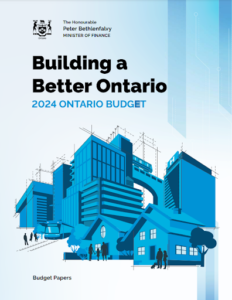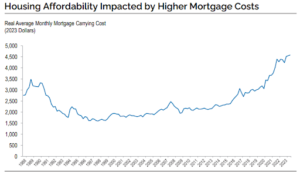Ontario budget has almost NOTHING NEW for affordable housing
Ontario’s 2024 budget dashed hopes for new housing investments. Released last week, the budget provides no new money for capital funding to build new non-profit housing. Nothing. There is new money for housing-related infrastructure and a bit of new money to operate supportive housing, some of it going to Hamilton’s Indwell, but little else for Hamilton. See more below.
 Ontario budget has almost NOTHING NEW for affordable NON-market housing
Ontario budget has almost NOTHING NEW for affordable NON-market housing
The lack of any new funding in the 2024 Ontario budget to build more non-profit or co-op housing is a blow to Hamilton. Our non-profit housing providers are ready to build more than a thousand units of affordable or supportive housing in the next 18 months—but they can’t do it without senior government funding.
The budget provides $1.8 billion in new money for municipal infrastructure, over three years. That’s supposed to lead to more private-sector housing. But as the Co-operative Housing Federation of Canada put it, without similar funding for non-profit and co-op housing, “those most negatively impacted by the housing shortage may never benefit” from provincial efforts to get more housing built.
The budget also includes an additional $152 million over three years to support health and related services (the supports) that sustain individuals in supportive housing. Some of that will go Hamilton’s Indwell for rent supplements and mental health and addictions services for 640 of its tenants. That is needed funding, but that total is small compared to the need.
There is no new funding to fix the mess that is the Landlord and Tenant Board, which needs a return to in-person hearings and significant improvements to end a huge backlog of cases.
The government will give municipalities the authority to impose a tax on vacant homes. Hamilton, as well as Toronto and Ottawa, already has this. The budget is right that “an unoccupied home is unacceptable in a housing crisis.”
And the government will allow municipalities to offer a reduced municipal property tax rate on new multi‐residential rental properties. Municipalities can little afford to do so, especially since the province previously reduced their development fees, vital revenue that is used to build infrastructure needed for new homes.
 The provincial government’s goal is 1.5 million new homes by 2031. The 2023 target was 110,000 new homes. The government claims it almost met that target—but only by counting 9,835 new or upgraded long-term care beds as new housing.
The provincial government’s goal is 1.5 million new homes by 2031. The 2023 target was 110,000 new homes. The government claims it almost met that target—but only by counting 9,835 new or upgraded long-term care beds as new housing.
The government hopes new supply will make it more affordable to buy a home but the chart above, included in the budget, shows affordability for home buyers is at its worst ever. The province blames recent high interest rates but rates have only risen in the past two years. A long period of low rates helped push up home prices for years, as did high demand and lots of financial speculation.
Survey finds strong support in Hamilton , the GTA and Vancouver for government funding of non-market housing
A Broadbent Institute survey found strong support in Canada’s most expensive housing markets—including Hamilton—for more government funding of non-market housing. See a summary here https://www.broadbentinstitute.ca/new_report_dreams_and_realities or read this article by Broadbent Institute Executive Director Jen Hassum in the Star: https://www.thestar.com/opinion/contributors/to-solve-the-housing-crisis-we-must-get-government-building-housing-again/article_a7d7a272-f058-11ee-845e-4312d3771594.html